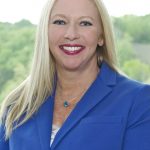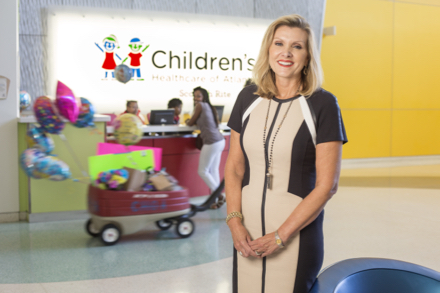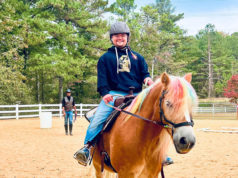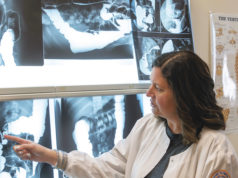The female leaders at metro Atlanta’s leading hospitals
By Cory Sekine-Pettite
*Editor’s note: some answers may have been edited for length or clarity.
Climbing the corporate ladder is challenging in any profession, but is especially difficult for women, who hold 52 percent of all professional-level jobs in America, but are poorly represented at highest levels of our leading industries and companies. According to the Center for American Progress, women make up just 25 percent of the executive- and senior-level officials and managers at the S&P 500 companies, and are only 6 percent of CEOs. In the legal field, they are 45 percent of associates, but only 22 percent of partners and 18 percent of equity partners. And in medicine, women comprise 37 percent of all physicians and surgeons, but only 16 percent of permanent medical school deans. The list goes on.
As one can see, it is a big deal when women work their way to the top. So this publication has decided to celebrate their accomplishments. First up is the healthcare industry, which in Georgia boasts several female leaders. What follows is a candid conversation with leaders at Northside Hospital, Children’s Healthcare of Atlanta, and WellStar.
Katherine Pearson
Director of Operations, Northside Hospital Cherokee

Katherine Pearson put herself through college and took a non-traditional career path on her way to becoming director of operations at Northside Cherokee. She worked as a business consultant for Accenture, SAP and Compaq, and as an ICU nurse before transitioning into healthcare leadership. “Once in leadership, my career began to evolve very quickly,” Pearson said. “…The ability to pull from my business consulting background and pair it with clinical knowledge proved to be a very effective combination in my career.”
Pearson’s role includes oversight of general operations for the hospital campus and non-clinical related services, including off-campus locations. Recently, she facilitated the successful relocation of all Northside Hospital Cherokee patients, staff, and technology to the new Northside Hospital Cherokee replacement hospital.
CIF: What led you to healthcare?
Pearson: I entered healthcare as a second career after I started a family. Knowing that I tend to throw myself into work, I wanted to find something that provided a deeper sense of fulfillment based off my values and ideals, something where I could leave at the end of the day and be able to say, ‘I did that.’ I have a friend who was an ICU nurse for over 20 years. When re-evaluating my career, I spoke with her at length about my goals, my initial work in healthcare, and options. My friend shared with me how I was describing the life of a hospital nurse! I chose to become an ICU nurse because it was an environment where I would have the opportunity to learn every day using new technologies and medicines in a fast-paced environment, while being able to support those who found themselves in life-changing situations.
Did you have any key mentors?
I have been very blessed to have many mentors over the last 25 years who have helped me grow as an individual and professional. My faith is a cornerstone in driving my values and approach to life. My mom, who successfully raised three children as a single mother, will always be my most valued mentor. She instilled in me an excellent work ethic and recognition that determination and an open mind will allow you to succeed.
There also have been amazing leaders who have helped shape my understanding of business and career development. One of the two more recent influences is Bob Crowe, a Cobb County resident. I worked for Bob during a pivotal career transition time. His vast experience, education, and life knowledge was a great influence on where I wanted to take my career. He illustrated how you can take diversity in work and life experiences and grow it into meaningful knowledge – and how to do it.
Another current mentor is Billy Hayes. Similar to Bob, he has a diverse professional background and strong understanding of the importance of interpersonal relationships. A key phrase of his that I have adopted is ending a conversation with ‘What can I do for you?’ I appreciate how this acknowledges that we are here to provide support to others and do our best to make them successful.
Did you have any female mentors as you’ve progressed through your career?
Yes, I have had several significant female leaders with whom I have had the opportunity learn. With many of them, their biggest impact [on me] was learning from their life lessons and observations. They emphasize the importance of how to view situations and opportunities from different perspectives. The key is to listen with all your senses to get the bigger picture. Listen to not only the words communicated, but also how the words are communicated. Listen to hear what is not being communicated in the message as well. These leaders also have taught me that regardless of the industry, the professional experiences and expectations for women are different. This does not mean they are right or wrong; they are just different. As a professional woman, you have to recognize and respect those differences for what they are and how they affect the professional environment.
What, in your opinion, is the biggest mistake women make when endeavoring to succeed in an otherwise male-dominated field?
I am not sure I would say there is one big mistake, but several pitfalls to avoid. One pitfall is to be sure that you consistently focus on the business issue and not allow yourself to be distracted by personality differences. Issue resolution is about identifying an organizational barrier and options to overcome it. Everyone has different ways of communicating. It is import to be able to identify different communication styles and how to effectively interact with them. Do not mistake a communication style with an actual issue to be resolved. Another pitfall would to be to undervalue your “sixth sense.” While not exclusive to women, women often develop a stronger ability to perceive more around us by naturally observing nonverbal cues, tones, and similar communication characteristics. Take advantage of your innate ability to recognize that there is more going on with individuals than what you see on the surface, and those factors often can influence decisions. The term “emotional intelligence” has become a hot term of late. I believe women often have this intelligence as an innate ability; they just need to recognize and develop it within the professional arena.
Do you think about how you are an influence on other young women?
I have had long conversations with not only my own daughter, but also female friends of both my children. It has always puzzled me how I would hear “You used to intimidate me when I first met you.” I would ask them to tell me what changed and they would say in talking to me they now understand the value I placed on self-respect and showing the same respect to others. I do not put much weight on how stylish a person is, but rather what they say and how they treat others. I expect others to look me in the eye and talk to me as a reasonably intelligent person. In turn, I will provide others with the same courtesy.
When I am talking with young women, I ask how they expect to be treated and what they do to encourage that level of interaction. If a person does not respect his or her abilities and have confidence, why should someone else? Part of that is recognizing there is no one person who has all the answers, and we should strive to learn from one another. I do not believe you can learn from those around you if you do not start by showing them respect for who they are and their life experiences.
Donna W. Hyland
President and Chief Executive Officer, Children’s Healthcare of Atlanta

Donna Hyland has spent the last 32 years at Children’s Healthcare of Atlanta, and the last 10 years as its CEO. This Kentucky native and certified public accountant, also had an indirect path to the healthcare industry, working in corporate accounting before transitioning to a hospital management company and eventually Children’s. “At Children’s, we care about people, we are passionate about kids, and we are dedicated to better. Those three core values are the driving force for everything we do and every decision we make, which ensures we’re meeting the needs of Georgia’s children for decades to come,” she said.
CIF: What led you to healthcare?
Hyland: Honestly, it was a bit accidental that I ended up in healthcare. But once I got into healthcare, it was very natural that I would stay in this field because I grew up in a family that was community-oriented and believed strongly in helping others. My career trajectory landed me at Children’s and I have worked here 32 years now, so I know it is where I am meant to be and the mission is one I was meant to serve.
Did you have any key mentors?
First and foremost, my grandparents were very strong mentors for me. They were people of great integrity and faith who were constantly doing things for others, which set such a wonderful example in childhood and beyond. On a professional level, I have had the opportunity throughout my career to work with some fantastic individuals who left a mark on my leadership skills. My first job in Atlanta was at Home Depot. Back then, the company was still small enough that you had access to individuals like Bernie Marcus, Arthur Blank, and Ron Brill. I have the utmost respect for these leaders. Additionally, during my time at Children’s, I had the privilege of working with outstanding board and executive leadership. Jim Tally, the former CEO of Children’s, was an important mentor and a significant influence for me. Current and many past trustees have inspired me and serve as an invaluable sounding board.
Did you have any female mentors as you’ve progressed through your career?
I have had the opportunity to observe many strong women in their positions at Children’s. Witnessing not only our talented female leaders, but also our frontline caregivers has provided wonderful examples for me. On a day-to-day basis, they inspire me, influence how I lead, remind me of what is most important, and ultimately affect the decisions I make.
What, in your opinion, is the biggest mistake women make when endeavoring to succeed in an otherwise male-dominated field?
I wouldn’t call it a mistake, but I think women may be more hesitant to speak up and make sure that their opinions and thoughts are heard. Everyone has a voice, and an organization thrives when we’re all represented and play a part. Great ideas can come from anyone and anywhere.
Do you think about how you are an influence on other young women?
As I have gotten older in my career, I have grown in the realization of the positive influence I can have on young women. I take that responsibility very seriously and keep it top of mind in my daily interactions. I particularly enjoy speaking to young women about the importance of work/life balance and juggling responsibilities as a working mom. I believe that as female leaders, we have an increased responsibility to make sure women feel supported in the workplace. Above all, that direct connection to other women is an opportunity to hear new ideas and continue building on our healthy Children’s work culture.
Mary B. Chatman, Ph.D., RN
Senior Vice President, WellStar Health System

Mary Chatman has spent her entire professional career in healthcare, working as a nurse in Greenville, North Carolina and Savannah, Georgia before moving into management. As the president of Kennestone and Windy Hill Hospitals, she collaboratively develops the vision and implements the strategic direction for both facilities. Chatman leads the organizations in maintaining and enhancing the culture, which is focused on the highest level of commitment to quality outcomes, patient experience, employee engagement, physician satisfaction, operational discipline, and financial stewardship.
CIF: What led you to healthcare?
Chatman: While I lived in an underserved community and saw the many challenges of healthcare, I actually wanted to be a math teacher or accountant. Then I was invited to attend a specialty school focusing on math and science. Because I was a high-performing student, but also vivacious and quite daring, my parents decided I needed structure, thus deciding not to send me to the specialty school. I resented their decision and decided I was going to pick another major, way on the other end of the professional spectrum. Well … I picked nursing. At first, it was out of rebellion. But I soon learned that I was cut out to interface with people and that I truly cared about their wellbeing. It felt natural.
Did you have any key mentors?
My dad was my biggest fan and supporter. He always encouraged me. He would say, “If you want to be a positive person, then hang out with positive people.” When he thought I wasn’t doing that, he was quick to redirect me. He also is who taught me how to be “tough.” He would say, “It’s okay to have emotions, but you can’t be emotional all the time. Learn to separate the two and manage who you are with that skill.” But, never lose your compassion and the connection of who you are and what you stand for.
Did you have any female mentors as you’ve progressed through your career?
Yes, many. They come from diverse backgrounds. I have learned to pick my battles, stand strong on your ethics, morals and values. Don’t act like the minority. Make sure people understand that you believe you belong at the table. Finally, signup for the part, look the part, do the part, and bring others along with you.
What, in your opinion, is the biggest mistake women make when endeavoring to succeed in an otherwise male-dominated field?
Staying focused and not getting distracted by the small stuff or the drama is important. Establish your rules of engagement. Most of the time, these are established not through what you say, but rather how you act.
Do you think about how you are an influence on other young women?
Everyday. I sometimes get up to 5,000 hits on my LinkedIn page. Often, I get positive feedback from young female executives cheering me on and asking for advice. I try to answer every one of them personally.
Callie Andrews
Senior Vice President, WellStar Health System

As president of WellStar Cobb Hospital in Austell, Callie Andrews oversees more than 2,400 team members and 1,000 medical staff and provider team members. It is her job to ensure that everyone is providing the highest safety and quality of care for the hospital’s patients. Andrews also oversees the new WellStar Vinings Health Park, which opened in September 2017, and consists of a number of outpatient practices, medical offices, a surgery center, and more.
CIF: What led you to healthcare?
Andrews: From an early age, I have always known I wanted to work in healthcare. I was fascinated by hospitals, healthcare professionals, and just inspired by the opportunity to change people’s lives. So, I have always been on a career path to pursue healthcare, and I originally thought that I wanted to be a clinician. I spent a summer in Ukraine that I consider to be a life-changing time, whereby I decided to change my education course and pursue a career in healthcare leadership. I returned to college, modified some of my courses, and pursued my dual master’s in business and healthcare administration at the University of Alabama at Birmingham.
Did you have any key mentors?
I have had the opportunity to work for and with a number of incredible healthcare leaders. My first boss was a female CEO in Rome, Georgia. She was an inspiration because of how she led and how she never compromised in her pursuit of quality care. The last CEO that I worked for at WellStar also was a woman. She was my mentor for two years and groomed me to be ready to accept this position. I learned a tremendous amount under her leadership. My current boss is a woman as well; I have had the privilege of working for Carrie Plietz since April. She is a source of tremendous inspiration, both for her leadership role in WellStar, but also nationally with the National College of Healthcare Executives.
What, in your opinion, is the biggest mistake women make when endeavoring to succeed in an otherwise male-dominated field?
Let your work speak for yourself. Work hard. Pursue your dreams. Don’t compromise your values. My advice is always to be humble, but confident and learn from every experience and opportunity.
Do you think about how you are an influence on other young women?
I do. I am the incoming president of the Georgia Association of Healthcare Executives. I mentor a lot of people through that organization, but I also mentor a lot of individuals who reach out from professional connections. I am a big believer in mentoring. I am here because a lot of people took the time to mentor me, and so I always try to pay that forward.




